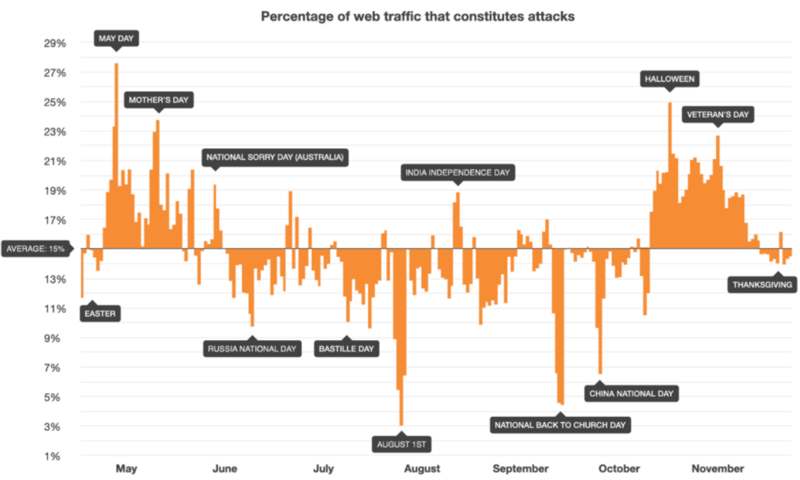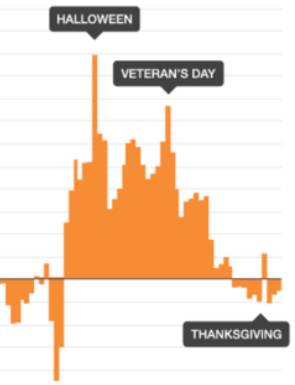| Cyber Attacks and Holidays |
| Written by Alex Armstrong | |||
| Friday, 23 December 2011 | |||
|
Just because you are taking a well-deserved break doesn't mean that cyber attackers are also taking it easy. When you inspect the incidence of attack, some holiday dates stand out. On a typical day, 15.31% of requests to a website are some sort of cyber threat. While that pattern is relatively stable, the day-to-day average can swing by as much as 10% and the spikes tend to occur on the dates when many of us are taking time off from work. CloudFlare, providers of cloud-based services to help secure and accelerate websites analyzed data across more than 100,000 websites and came up with this chart:
(Click in chart to expand and close with X at top right.)
The dates that stand out are: May Day, Halloween, Mother's Day and Veteran's Day. Perhaps surprisingly, Thanksgiving experiences a slightly lower threat level than usual and as yet there's no data for Christmas and New Year. However, on its blog CloudFlare notes: Last year we saw a run up in attacks prior to Christmas and then a significant drop off on Christmas itself, and an even larger drop on New Year's Day. We didn't have the scale last year to draw meaningful conclusions, but we'll be watching carefully this year and report back after we see what happened.
On the chart the largest decrease is August 1st which is a holiday in China, as is China National Day which also shows a decrease. The second biggest negative spike is labelled "National Back To Church Day" which might be a spurious co-incidence but what the real cause is remains a mystery. After some hours research, with the help of the likes of Wolfram Alpha, we still couldn't find a reasonable explanation. If you can, please email the editor. Notice that the inferred location of the attack doesn't mean that the actual attackers are located in that country. More likely the bot-nets that carry out the attack are located in those countries.It is more likely that attacks decrease on national holidays, not because the attackers take the day off, but because infected office computers are switched off over the holiday. Attackers are certainly aware of the significance of holidays. For example, while overall attack traffic was relatively stable on Cyber Monday, CloudFlare found that e-commerce sites saw a 45% increase in attack traffic directed at them on the busiest online shopping day of the year. So, if you are responsible for website security bear in mind that hackers' holidays don;t always coincide with yours.
To be informed about new articles on I Programmer, subscribe to the RSS feed, follow us on Google+, Twitter, Linkedin or Facebook or sign up for our weekly newsletter.
|
|||
| Last Updated ( Friday, 23 December 2011 ) |


